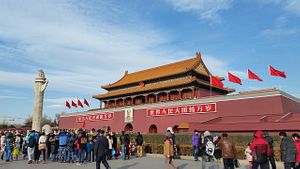It used to be a common understanding that the United States was the greatest defender of the liberal-democratic world order. America, in concert with like-minded allies in Europe and Asia, built enduring international institutions. Even more important, the United States was a living example of how a country could be both powerful as well as introspective and resolved to deepening its own domestic commitment to liberal democracy.
What are the values that make liberal democracy attractive to foreigners who live under illiberal regimes? “Freedom” alone, denuded of detail, is not necessarily a sufficiently concrete model for how one’s country and world should be ordered. Given the Chinese Communist Party’s full-throated efforts to reshape the world in its own illiberal image, it is especially important that liberal democracies understand what aspects of liberal democracy the common man in China can find attractive. What nagging aspects of life can liberal democracy address? Events over the last two weeks in China highlight what Chinese are seeking and how liberal democracy can provide it in ways that the Party cannot. Liberal democracies need to understand this.
Last week, thousands of Chinese who lost their investments in risky, unregulated Peer-to-Peer (P2P) internet lending platforms planned a massive demonstration to seek last-resort redress from the government, only to have the Communist Party-state clear them away in hundreds of awaiting buses as they showed up in Beijing. The Chinese people sardonically call such government actions to prevent protests “being harmonized.”
This abortive protest touches on many things. Like the endless bike share graveyards or the empty “ghost developments,” the P2P crisis illustrates the unregulated and dynamic frenzy of China’s current investment environment. It highlights the hypocrisy and perpetual existential crisis of an unelected Communist Party presiding over a wild west capitalist society. The P2P issue further reflects the Party-state’s misguided efforts to shape social behavior unrestrained by an autonomous civil society (here, I refer to the government’s big internet investment push, which largely encouraged the investors who lost their money). The government’s massive police response to the planned protest signals both the government’s successful monitoring of social media to predict large scale events and the Party’s resolve to control any types of large-scale associative human behavior.
But more than anything else, the protest makes clear once more the utter lack of even nascent rule of law in China and the hunger of Chinese citizens for the security of property that only rule of law can provide. These erstwhile protesters, like many others before them, knew that they could not seek redress in the “People’s Courts,” but had to seek it by getting the attention of certain leaders. This is the essence of rule of man as contrasted with rule of law.
For the Chinese little guy, rule of law is first and foremost about protecting hard-earned property. When Tsinghua University Law Professor Xu Zhangrun courageously published his essay two weeks ago criticizing the Communist Party and Chinese government on a number of accounts, his grievance was not the lack of abstract freedom. Instead, he pointed out that the Chinese people’s “first worry” in the current era is their fear that their hard-won property is not secure under the law. Chinese citizens know that their national and local leaders collude with family members and business associates to steal with impunity what little ordinary people have been able to collect. They also know that when someone is close to getting caught, the offender can simply flee to the United States, Canada, or Australia.
The only remedy for this is a true rule of law, where the government is an equal party before the law. Unfortunately, the CCP correctly understands that making law supreme over the Party’s will would be signing its own death warrant. Despite high-profile political campaigns claiming to establish so-called “Socialist Rule of Law with Chinese Characteristics,” as one top Chinese legal scholar told me, this whole campaign is actually about destroying rule of law. Indeed, the Party’s “rule of law” campaign is merely seeking a deeper and more formal subordination of the law to the Party. As my colleagues and I have argued elsewhere, the law in China is essentially just an expression of the Party’s will and has no independent capacity to provide justice. It is unfathomable in China, for instance, that a judge could issue an injunction against the president.
When ordinary Chinese look to the liberal democracies, what they envy the most are secure property rights guaranteed under law that is not just a mere expression of a powerful Party or leader’s will. Liberal democracies must recognize this potential. If the United States is going to continue to use its soft power to universalize liberal-democratic norms, it must recognize what makes those norms attractive to different peoples. To many Chinese, the existence of an independent judiciary, a nonpolitical department of justice and investigative agencies, transparency in proceedings, and equality before the law are the types of things that make liberal democracy so attractive. The United States should double down domestically on its commitment to these things.
The United States must show that a country can remain powerful on the world stage not in spite of liberal democracy, but because of it. The United States must demonstrate that this same liberal democracy that makes a country powerful is also the only thing that makes it possible to have true rule of law that can protect the hard-earned fruits of one’s labor.
E. John Gregory, JD, Ph.D. is a Lieutenant Colonel (Promotable) in the United States Army. He is Director of the Chinese Academic Program in the Department of Foreign Languages at the United States Military Academy and Director of the Center for Languages, Cultures, and Regional Studies (CLCRS). The views expressed here are personal and do not necessarily reflect those of the Department of Defense, the United States Army, the United States Military Academy, or any other department or agency of the United States Government.

































